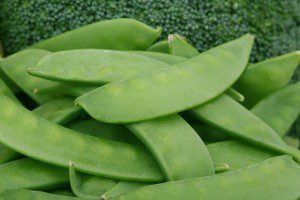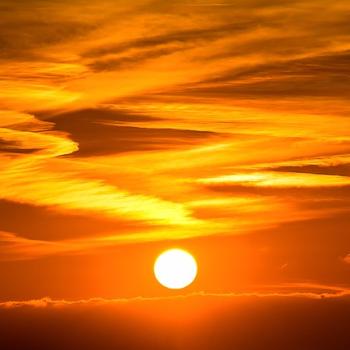
The garden is growing by leaps and bounds; the zucchini seedlings are already doubled in size, set to conquer the world as zucchini always does. The corn is almost four inches. We’ll pick lettuce within a week. But the sugar snap peas are already abundant. Sugar snap peas always come first; you’re supposed to sow soaked peas in mid-March, so that they start bearing fruit in late May and early June. When they die off in the July heat, I’ll plant a second batch for an autumn crop. We’ve got an abundance of sugar snap peas, but I haven’t brought a single one into the house, and I haven’t eaten any myself. I don’t know if I’ll get to eat even one. You see, they’re not for me.
Sugar snap peas are my daughter’s favorite, one of the only vegetables she truly enjoys. They’ve become her special domain. It’s a frustratingly rainless spring here in the Ohio Valley, so our afternoons are taking on a pattern: I drag the rain barrel inside, fill it from the tap, shove it outside and water the garden. Rose scavenges through the pea trellises, eating her fill of bright green pods, and then she jumps in what’s left of the water to play while I pull weeds. When the beans are ripe, she’ll hunt and eat beans off the bush, without quite as much relish as she has for the peas; when the carrots are ripe, she can pick her own carrots. I won’t have to strategize how to get vegetables into her until frost.
Yesterday evening, Rose was eating a handful of peas from the garden, when her friends rode by on their bikes. “Rose,” they said, panicked. “Don’t eat those! They’re poison!”
Rose tried to explain that they weren’t.
“No! You can’t eat those! They’re poison!”
She repeated that they weren’t, but her friends would not believe her. I was puzzled. Why would they think I was growing poisonous vegetables?
Then I remembered that one afternoon earlier this spring, Rose had been picking buttercups and clover for a bouquet, when Ezra the neighbor boy confronted her gravely. “Why are you picking poison flowers?”
I gather that it’s the custom in the Ohio Valley, for parents to tell their very young children that all plants are poisonous. They drill that into them when they’re very small, to keep them from nibbling weeds or house plants that might actually harm them. Slap your child on the wrist, waggle your finger and say “poison” often enough, and they’ll be safe.
Now, I don’t want to turn this post into a diatribe against northern Appalachian parenting techniques. I don’t know what works for other people’s families; I barely even know what works for mine. But imagine thinking that all plants were poisonous. Imagine raising someone else to believe that all plants are poisonous.
One of the first things I did with Rose, when she was old enough to walk behind me, was to take her foraging for wild black raspberries in the alley behind our old apartment. I pointed out what was a berry and what wasn’t, the weeds that were poison and the weeds she could eat. A friend helped me with the plants I couldn’t identify, and she taught Rose as well. I kept her away from lawns that had just been sprayed, but I let her walk barefoot just about everywhere else. Later that same spring, we foraged for violets and dandelions for salad, but we didn’t eat plants I couldn’t identify. Then we planted our own garden. She eats snap peas and raw beans; she picks heads of broccoli and crunches them like apples.
Imagine not knowing you could eat a head of broccoli like an apple. Imagine not knowing what a black raspberry was. Imagine not knowing the difference between food and poison, because you were taught that food was bad for you.
I think there’s a school of thought that would catechize children in the same way that my neighbors teach their children botany. It’s not something all homeschoolers do, but I’ve seen it in homeschoolers. It’s not something that all Catholic schools do, but I’ve seen it afoot in some of the ways people are taught in Catholic schools. It’s not intrinsic to Evangelical Christianity, but I’ve seen Evangelical Christians do it. There’s a certain school of thought that thinks everything is poison.
In this school of thought, every object in your field of vision is a potential danger. You can’t let your child watch a cartoon without watching the cartoon first to check for Satanic symbols. You can’t let your child play with a cootie catcher for fear it’s divination. You can’t read your child fairy tales or let them watch Bedknobs and Broomsticks, for fear they’ll become pagans. They can’t wear shorts on a hot day for fear they’ll be sexualized. If you let them be civil to people from different religions than you, they might convert away from the Faith. If they go to a party, they might take drugs. If they dance, they might have sexual thoughts before the proper time. If they listen to secular music, they might be distracted from the Lord. Better to keep them away from everything that might conceivably be an occasion of sin. Don’t teach them how to forage; better to tell them that everything is poison.
When you belong to that school of thought, you quickly find the world shrinking. Fewer and fewer activities go on the “food” list, while the “poison” list gets more and more out of hand. And it’s so hard to tell that it’s getting out of hand, because scruples look so much like piety. Of course, you’re not supposed to conform to the ways of the world. Of course, the world will hate you and make it difficult for you. Doesn’t that mean, then, that you’re following God, when you wear ridiculous clothing and never let your children have any fun? Isn’t it just your sanctity that makes people think you’re a prude? And there’s the real danger: you might come to think that through your own efforts, through fasting from all good things for fear of poison, you’ve made yourself holy. You may mistake your squeamishness for virtue and your multiplication of efforts for virtuous acts. You may come to think that you can buy your own sanctity, by bargaining away the gifts God has given you in His creation. OCD and other neuroses that lead to scruples are pathologies and not sins, but there is an occasion of sin here, for people who take up this heavy cross willingly. The sin is pride. No action of ours, least of all spiritual orthorexia, can make us holy. And declaring harmless things sinful goes a step further; you usurp God’s position as judge, and you call evil the things which He pronounced good.
I am not an excellent person, but I have found a more excellent way.
God created the whole universe, every tree and plant, every rock, every star. God created people who love to play and dance and eat and make up stories. God created these things and pronounced them good. He made them so good that every created thing would point back to Him, the source of all goodness. And then, through our grievous fault, Creation fell. Now everything, except for God Himself, is laced with a bit of poison, and we are in danger. But our Father has not abandoned us. He takes us foraging in the alleys, and teaches us which berries are delicious and which we must not eat. He doesn’t want us grazing on grass that has been sprayed, but He takes us out barefoot into the garden. He bids us eat all the peas we like, and then come play in the water.
The first commandment was not “do not eat from the tree of the knowledge of good and evil,” it was “you may eat from any of the trees you like.” The one restriction came after the assurance of great freedom. The Serpent tempted Eve by telling her that God had given her more restrictions than He already had. Thus was man trapped. Don’t make that mistake. Teach your children what things are actually forbidden, because they are poison; don’t neglect that. But most of your time should be spent teaching them that everything that isn’t poison is good. It’s wonderful. God’s creation is wonderful, and we ought to eat and dance and play and rejoice. We ought to eat broccoli like apples, right off of the stalk. We ought to forage in the sugar snap peas. We ought to go barefoot where the grass hasn’t been sprayed. God is good, creation is good, and food is delicious. Peas are good for you. Be free, and have fun in the garden.
(Image via pixabay)













